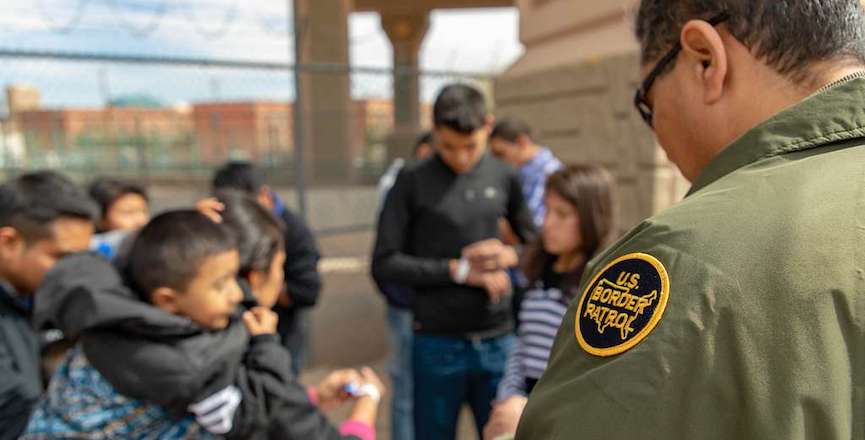Images of U.S. Border Patrol agents on horseback whipping Haitian asylum seekers as they waded across the Rio Grande River into Texas shocked the world this week. After as many as 15,000 refugees arrived, sheltering under a bridge in Del Rio, Texas, President Joe Biden responded with an aggressive deportation campaign. His administration invoked President Donald Trump’s anti-immigrant “Title 42” public health deportation policy to send planeloads of people back to Haiti, despite political turmoil there following the July assassination of President Jovenel Moïse and a devastating earthquake last month.
“What the hell are we doing here,” asked Democratic California Congressmember Maxine Waters at a news conference in Washington, D.C. on Tuesday, surrounded by members of the Congressional Black Caucus.
“What we witnessed takes us back hundreds of years. What we witnessed was worse than…slavery, cowboys with their reins, whipping Black people, Haitians, into the water where they’re scrambling and falling down when all they’re trying to do is escape from violence in their country.”
Waters was not alone in her criticism. On Wednesday morning, U.S. Special Envoy for Haiti Daniel Foote resigned his post in a letter obtained by PBS:
“I will not be associated with the United States’ inhumane, counterproductive decision to deport thousands of Haitian refugees and illegal immigrants to Haiti, a country where American officials are confined to secure compounds because of the danger posed by armed gangs in control of daily life,” Foote wrote. “Our policy approach to Haïti remains deeply flawed, and my recommendations have been ignored and dismissed.”
Foote’s scathing letter continued:
“The people of Haiti, mired in poverty, hostage to the terror, kidnappings, robberies and massacres of armed gangs and suffering under a corrupt government with gang alliances, simply cannot support the forced infusion of thousands of returned migrants lacking food, shelter, and money without additional, avoidable human tragedy…The collapsed state is unable to provide security or basic services, and more refugees will fuel further desperation and crime. Surging migration to our borders will only grow as we add to Haiti’s unacceptable misery.”
Reports also surfaced of Haitian migrants who had been shackled at their waist and feet by their U.S. captors, and that the pace of deportation flights was increasing to as many as seven per day.
Christopher Columbus made landfall on the island he named “Hispaniola” in 1492 and, on behalf of Spain, subjected the native Taino population to a brutal genocide while extracting as much wealth as possible. Spain imported enslaved African people to replace the indigenous people they killed. In 1697, France took control of the western half of the island, forming what would become Haiti, while the Spanish colony known as Santo Domingo, later to become the Dominican Republic, remained on the eastern half.
The violence and oppression continued, while Haiti became France’s most profitable colony. With an estimated 85 per cent of Haiti’s population enslaved, torture, whippings, and murder were used as regular instruments of control. Revolutions outside the country did not go unnoticed by the Haitians, with the successful rebellion against the British in the 13 colonies to form the United States followed soon after by the French revolution in 1789.
In fact, Haitians actually fought in the American Revolution. Britain occupied Savannah, Georgia during the Revolutionary War, and, in 1779, George Washington’s rebel Continental Army laid siege to the city. France sent ships and troops to help, among them between 500 to 900 soldiers of coluor recruited from Haiti. The Chasseurs-Volontaires de Saint-Domingue, as they were called, were mainly Haitian freedmen of African descent. They suffered significant casualties. A monument to these Haitian soldiers was unveiled in Savannah in 2007.
Enslaved Haitians rose up against their French oppressors in 1791, and, fighting against what was then considered the greatest military on the planet, under Napolean, emerged victorious, founding Haiti as the first Black republic in 1804. The United States refused to recognize the new nation of Haiti, afraid that the successful slave uprising would inspire similar revolts in the United States.
In 1825, Haiti was forced to pay France reparations, which hobbled the Haitian economy for well over 100 years. Since the 1950s, dictatorships, coups d’états, assassinations, political meddling and occupation by the United States and a series of earthquakes, hurricanes and drought have left Haiti the poorest nation in the western hemisphere.
Given the scale and duration of Haiti’s suffering, it is surprising that only 15,000 refugees have gathered under that bridge in Del Rio, Texas. The Biden administration has a chance to change direction, to put away the whips and shackles that Haitians have endured for over 500 years, and live up to the promise to the poor, huddled masses enshrined in that towering beacon, a gift from France, the Statue of Liberty.
Amy Goodman is the host of Democracy Now!, a daily international TV/radio news hour airing on more than 1,300 stations. She is the co-author, with Denis Moynihan, of The Silenced Majority, a New York Times bestseller. This column originally appeared on Democracy Now!
Image: U.S. Customs and Border Protection/Mani Albrecht/Picryl



